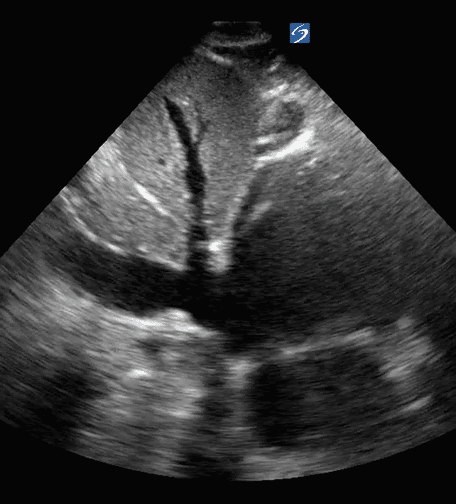E-newsletters
November 2022: POCUS Care for Wintertime Shortness of Breath

With the winter season soon approaching, many people may find themselves struggling with shortness of breath as the air gets colder and winter viruses circulate. Respiratory infections and viruses, such as the flu and COVID-19, often occur at higher rates in the winter months. This report predicts that COVID-19 daily cases will rise to 18.7 million globally by February, compared to current rates of 16.7 million daily cases. RSV is another virus that is also on the rise. While this virus is not new, the burden of disease seems particularly greater this year. Read more from the CDC here about RSV and which patient population is at greater risk for morbidity and mortality.
Bedside POCUS can be helpful in diagnosing causes of shortness of breath in hospitals and outpatient settings. Last year, the American College of Physicians issued a new guideline on the use of POCUS as an addition to standard diagnostic procedures for patients with acute shortness of breath and an uncertain diagnosis. You can read more about this new guideline in the Annals of Internal Medicine.
People struggling with wintertime shortness of breath can use these preventative measures to help keep their lungs healthy so they can breathe easily during the winter months:
- Quit smoking and avoid exposure to tobacco smoke
- Get vaccinated against flu and COVID-19
- Maintain a healthy body weight
- Avoid exposure to pollutants and allergens
- Follow your treatment plan if you have respiratory conditions, such as asthma or COPD

For this month’s newsletter, we wanted to focus clinical cases and pathophysiology around the chief complaint of shortness of breath, which is a common complaint in the winter time.
To learn more about the application of POCUS in the diagnosis and management of shortness of breath and dyspnea, check out these guidelines by the American College of Physicians (ACP) when assessing and managing patients for congestive heart failure, pneumonia, pulmonary embolism, pleural effusion, or pneumothorax in the acute setting.
Case Study #1
While working in a clinic in Kenya, you evaluate a 60-year-old patient in the urgent care clinic who is presenting with 1 month of progressive shortness of breath, exertional chest discomfort, and lower extremity swelling. In the clinic, his vital signs are notable for a heart rate of 110, a respiratory rate of 30, and hypoxia to 92% on room air. While you are waiting for the tech to perform the EKG, you perform bedside echo which shows heart failure. While assessing the images, you think through the differential diagnosis.

Learn more here about the application of POCUS in heart failure diagnosis and management in this particular global health community. The differential is particular as it includes hypertension, cardiomyopathies, and rheumatic heart disease. Additionally, the differential may vary between urban and rural patient populations. Additionally, treatment modalities will be different based upon resource availability.
Case Study #2
You are conducting a follow up visit with your 80-year-old patient who was recently admitted, and then discharged from the inpatient with the diagnosis of COVID-19 pneumonia. You review the electronic medical record from the admission and can see the lab, imaging, and consult notes. Your patient informs you that she was initially feeling good after discharge, but has started to feel fatigued and short of breath in the last 3 days since discharge. However, your patient is also quite distressed at the thought of having to potentially be readmitted to the hospital if she does not improve. As part of your evaluation, you decide to do lung ultrasound to help determine next best steps in management.

As part of your assessment, you know that POCUS and lung ultrasounds in particular can help in outpatient monitoring and perhaps reduce emergency departments visits and hospital scans.
Read more here about a literature review of lung ultrasound and management of patients with COVID-19 pneumonia.
Case Study #3
Shortness of breath has many etiologies, including fluid overload states, which also happens amongst patients who have chronic kidney disease that are on dialysis. Your hospital system is trying to explore how to provide efficient and effective healthcare to vulnerable patients within your system at the bedside as much as possible. As such, they have engaged with the nephrology group to see if POCUS can be incorporated during dialysis to monitor for ejection fraction and hemodynamic fluid status for patients.

As this remarkable study has shown, even in dialysis outpatient units, POCUS can be used to determine patient ejection fraction and hemodynamic status. Given the amount of time patients are at dialysis units, this is an ideal opportunity for providing important healthcare for patients.
Additionally, the future application of POCUS in end-stage renal disease is growing as shown in this publication for the use of POCUS in determining the maturation of arteriovenous fistula. This study showed a reduced time for the requirement of indwelling central venous catheters, which reduced the potential risk of infection.
Faculty Spotlight
Dr. Temesgen Beyene (MD) is a consultant and an Assistant Professor in Emergency and Critical Care Medicine, Head of the Department of Emergency Medicine at the College of Health Sciences, Tikur Anbessa Specialized Hospital, and Addis Ababa University, Ethiopia. He is also the recipient of Developing Countries POCUS Educator Scholar from Emergency Medicine Ultrasound Groups of Australia. His work focuses on teaching, clinical care, and clinical research. He is professionally certified by Harvard Medical School in Global Clinical Scholars Research Training Program Clinical Trial Concentration in 2017. Currently, he is very passionate about spreading POCUS teaching anywhere to anyone at any time.
GUSI on the Move

Earlier this November, GUSI traveled to Kansas University Medical Center, in Kansas City. This two-day course focused upon teaching POCUS applications within primary care to the family medicine faculty and residency.
We would love to teach at your institution! Contact us to learn more about our custom courses.
GUSI Decreases Barriers to POCUS Education – through Language Access!
The GUSI Essentials Course is now available online with closed captioning in English, Spanish, French, Portuguese, and Ukrainian.

GUSI News
|
|
OB Ultrasound Initiative
GUSI Gives Back
|
 |
 |
Check out our instructors exploring San Francisco Chinatown and Italian Village during the October POCUS for Primary Care Course. Although we come from different fields in medicine (Family Medicine, Emergency Medicine, Sports Medicine, Radiology, and Sonography), we love to collaborate, teach, and share the knowledge of our respective fields together – in a way that makes all of us better instructors.
POCUS Training is for Everyone
 |
 |
Dr. Opal Taylor teaching faculty from the UCSF Family Medicine Residency how to measure bladder volume.
Did you miss this month’s flagship POCUS course? Don’t worry, we will hold our next conference April 13-14, 2023 at the Hilton in San Francisco. Secure your spot today!
Best wishes,
Kevin, Mena, & the GUSI Education Team
Sign up for GUSI’s e-newsletter and updates here.





